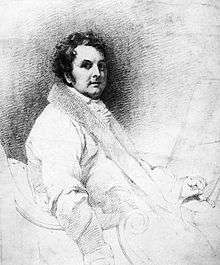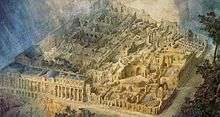Joseph Gandy
| Joseph Gandy | |
|---|---|
 Sketch of Joseph Gandy by Henry William Pickersgill, 1822. | |
| Born |
1771 London |
| Died |
25 December 1843 Devon |
| Nationality | English |
| Known for | Painting |
| Patron(s) | Sir John Soane |
Joseph Michael Gandy ARA (1771–1843) was an English artist, visionary architect and architectural theorist, most noted for his imaginative paintings depicting Sir John Soane's architectural designs. He worked extensively with Soane both as draughtsman and creative partner from 1798 until 1809 when he (ultimately unsuccessfully) set up his own practice.
Family
Joseph Gandy was the son of Thomas Gandy (1744–1814) and Sophia née Adams (1743–1818). He was the brother of the architects Michael Gandy (1778–1862) and John Peter Gandy, later Deering (1787–1850).
He married, in 1801, Eleanor Susannah Baptist née Webb (1773–1867), daughter of Thomas Webb and Catherine née Wiggington. Among their children: Mary Gandy (1810 –1888) married Francis Impey (1812–?) attorney, son of Vice Admiral John Impey RN (1772–1858); and Thomas Gandy (1807–1877), portrait painter,[1] married Catherine née Hyde (1811–1889), they were great grandparents of Robin Oliver Gandy (1919–1995).
Career
Gandy built little in his career, having a reputation as a difficult individual to deal with. However his work included the Phoenix Fire and Pelican Life Insurance Offices (1804–1805, destroyed c. 1920) in London, Doric House at Sion Hill in Bath (1818), and the remodelling of Swerford Park house in Oxfordshire (1824–1829). Commercially he was a failure and served two terms in a debtors' prison, but his published and exhibited work was largely a critical and popular success. In 1821 he published two articles in the Magazine of Fine Arts on The Philosophy of Architecture. He intended to expand upon this subject in an eight-volume work entitled Art, Philosophy and Science of Architecture, of which his unpublished manuscript survives.

His paintings show a dramatic use of two-point perspective and architectural precision, and also reflect his (and Soane's) fascination with Roman ruins. His architectural fantasies owe a clear debt to Piranesi and play upon historical, literary and mythological themes with a feeling for the sublime that is the equal of his contemporaries J. M. W. Turner and John Martin.
Death and legacy

Gandy died in a private asylum in Plympton, then on the outskirts of Plymouth where he had been placed by his family in 1839. Many of his paintings can be seen in the Pictures Room of Sir John Soane's Museum in London.
Bibliography
- Joseph Gandy, Designs for Cottages, Cottage Farms, and Other Rural Buildings: Including Entrance Gates and Lodges. London: John Harding, 1805.
- Joseph Gandy, The rural architect: consisting of various designs for country buildings, accompanied with ground plans, estimates and descriptions. London; John Harding, 1806
- 'Joseph Gandy in the shadow of the Enlightenment: The annual Soane Lecture', Brian Lukacher, 2002. ISBN 978-0-954228415.
- 'Joseph Gandy: An Architectural Visionary in Georgian England', Brian Lukacher, 2006. ISBN 978-0-500342213.
References
- ↑ "BBC: Your Paintings - Thomas Gandy". BBC. Retrieved 6 February 2016.
External links
| Wikimedia Commons has media related to Joseph Gandy. |
- Joseph Gandy, Designs for Cottages, 1805
- Let there be light
- The Tragic Genius of Joseph Michael Gandy
- Profile on Royal Academy of Arts Collections